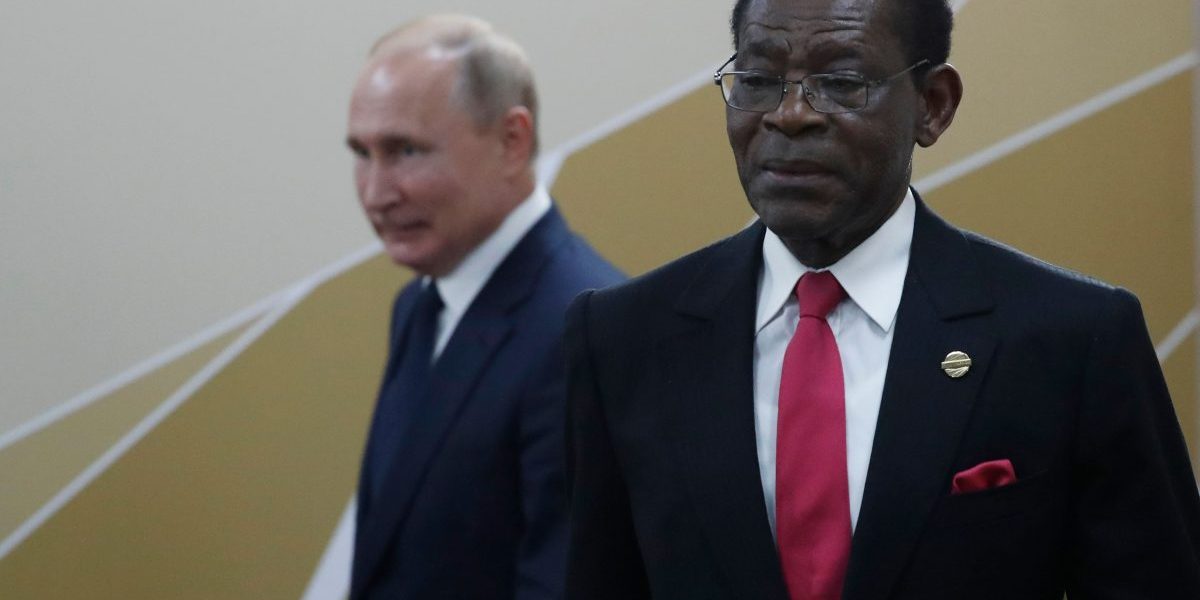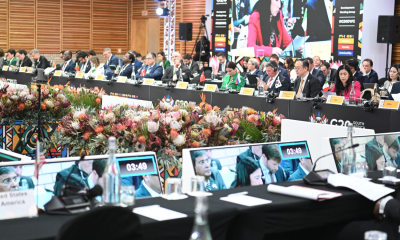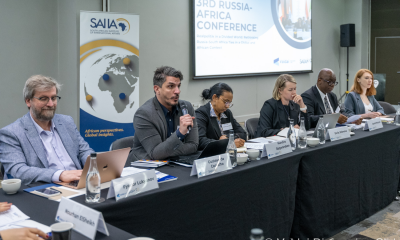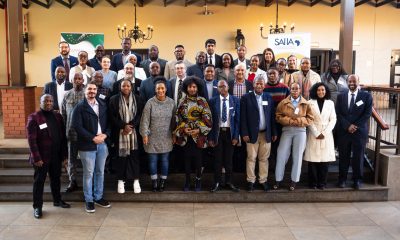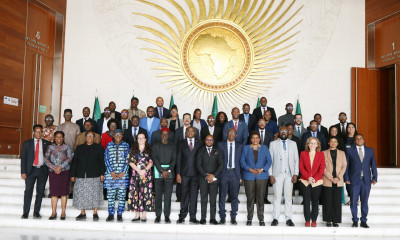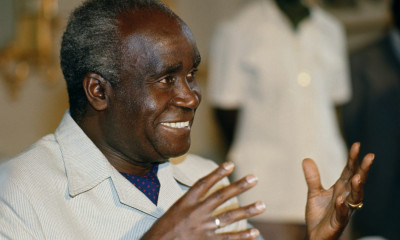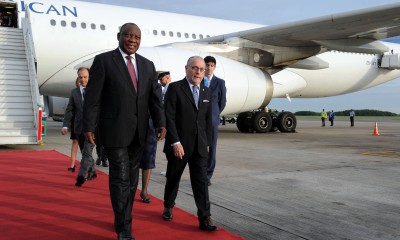African leaders are due to meet with members of the Russian leadership again in 2022. Where do ties between the two stand as the 2020s get underway?
The African continent has a long history of ties with Russia. The Soviet Union supported anti-colonial movements in a number of African countries and facilitated academic exchange programmes for young people across the continent. However, following the collapse of the USSR, and preoccupied with domestic challenges, Russian involvement significantly declined in Africa during the 1990s.
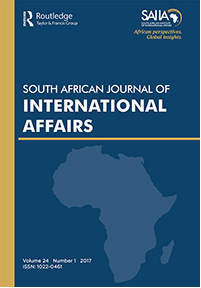
As Russia’s economic conditions improved, and as its geopolitical role was bolstered by a more aggressive foreign policy under President Vladimir Putin, Russian involvement on the African continent has revived. A high point of this increasing engagement was the Russia-Africa Summit held in Sochi in 2019. This summit was the first of its kind and attracted 43 African heads of state. Planning for the 2022 Russia-Africa Summit – probably in St Petersburg in early November – is reportedly underway.
Apart from Russia, a host of external partners remain interested in Africa. These range from the US, Britain, the EU and its constituent members to China, India, Turkey, Israel and the Gulf States. An important question to consider is how to situate Russia’s involvement in the context of other powers that seek to increase their engagement on the continent.
While there is growing research and literature on Africa-Russia relations in the post Cold War era, not many studies have assumed an African or Global South(ern) perspective, leading to a partial understanding of the extent to which Russia’s foreign policy impacts Africa and vice versa. Such research is crucial for comparative academic studies of external actors in Africa, as well as for policy makers and analysts attempting to understand Russian actions vis-à-vis the continent.
Against this backdrop, we invite papers from researchers who are engaging with diverse and innovative perspectives on Africa-Russia relations for publication in a special issue of the South African Journal of International Affairs.
The special issue would like to explore the following themes:
- The geopolitical context of Russia in Africa: international factors underlying renewed interest/growing ties
- Russia’s growing military and naval presence in Africa and the region, through official channels as well as private military contractors.
- Key African states’ bilateral relations with Russia: where is Russia focusing and do African states have agency in their relations with Russia?
- The economic drivers of Russia’s interest in Africa, including the role of Russian state-owned companies and their investments on the continent.
- Russia’s tools for building influence in Africa, including leveraging historical liberation networks, education diplomacy, foreign aid, vaccine diplomacy and public health.
- Africa’s natural resources and governance issues arising from Russian interest, i.e., Russia’s undersea surveillance and geological exploration in the region – including Antarctica.
- Russia and African governance challenges, including Russia’s role in African elections and the use of political technologists, disinformation, and cyber warfare.
- Assessing the impact of the Russia-Africa Summit in 2019: progress since Sochi?
Deadlines for submission
Prospective authors should send articles to the guest editors via the Journal Editorial Office (journal@saiia.org.za) for internal review by Wednesday, 20 April 2022. If authors are uncertain whether an article fits within the special issue, they may email an abstract no longer than 150 words to journal@saiia.org.za before submitting the article itself. Publication can only be confirmed; however, after the peer review and revision process is complete.
Once approved for further consideration, the authors should then submit the article for external peer review, per the guidelines below, via the SAJIA Scholar One site, by 12 May 2022 (unless further work on the article requires an extension, in which case the guest editors will convey a separate deadline).
We expect to publish the special edition in November 2022, so please take that into consideration when writing your article.
Submission of articles on Scholar One
- All submissions should be made online at the journal’s Scholar One site. New users should first create an account. Once a user is logged onto the site, submissions should be made via the Author Centre. Online user guides and access to a helpdesk are available on this website. Technical support is also available from the SAJIA editorial team.
- Authors should prepare and upload two versions of their manuscript. One should include the name and affiliation of the author or authors. The second must be anonymous, for the purposes of blind peer review.
- If it is not possible to submit an article via the internet, two copies of the manuscript as detailed above should be sent to The Editor, South African Journal of International Affairs, c/o the South African Institute of International Affairs, P.O. Box 31596, Braamfontein, 2017, South Africa.
- Submitted articles must not be simultaneously under consideration for publication elsewhere.
- Articles should be accompanied by the following information:
- An abstract of 150 words or less.
- Key words or terms, to be used for indexing purposes (5-8). These terms should include the continent or region and the country/countries dealt with in the article, as well as other words reflecting the subject matter.
- A title that clearly demonstrates the theme of the article, for purposes of easy discoverability in library and internet databases.
- A brief bio for each author, for the ‘note on contributors’ at the end of each article.
- Where applicable, the ORCHID identifier, LinkedIn name, and Twitter handle of the author can be forwarded with the article.
- If there is more than one author, please indicate which will serve as the primary correspondent on the paper.
- Article length should be between 6 000 and 9 000 words, excluding references and other endnotes.
- References should be in endnotes using the Chicago (Notes) style. See the SAJIA style guide for more details on references. Notes must be linked so that with a click of the mouse on the inserted reference number, the reader goes directly to the correct note. For further information about how to use Microsoft Word’s endnote function to insert linked notes, please see: https://softwareaccountant.com/insert-endnote-in-word/.
- Articles should be typed double-spaced, in font-size 12, and submitted in WORD format.
- Tables and figures should be clearly labelled, with keys and source notes, and include no endnotes. The tables/figures may either appear at the end of the paper, or be presented in a separate file clearly marked as such.
- All submissions accepted for further consideration will be subject to peer review. Reviewer comments will be sent to the author along with the editor’s decision.
- Authors should carefully proofread their articles before submitting them. Articles with typographical, spelling and grammatical errors do not make a good first impression, and may be rejected prior to peer review.
- Plagiarism is regarded as a serious offense. Any idea or quotation from another source must be fully acknowledged in the endnotes and references.
- Permissions for the reproduction of any figure, table, or extract from the text of another source (even derivative) are the responsibility of the author. For more information please see: https://authorservices.taylorandfrancis.com/using-third-party-material-in-your-article/

